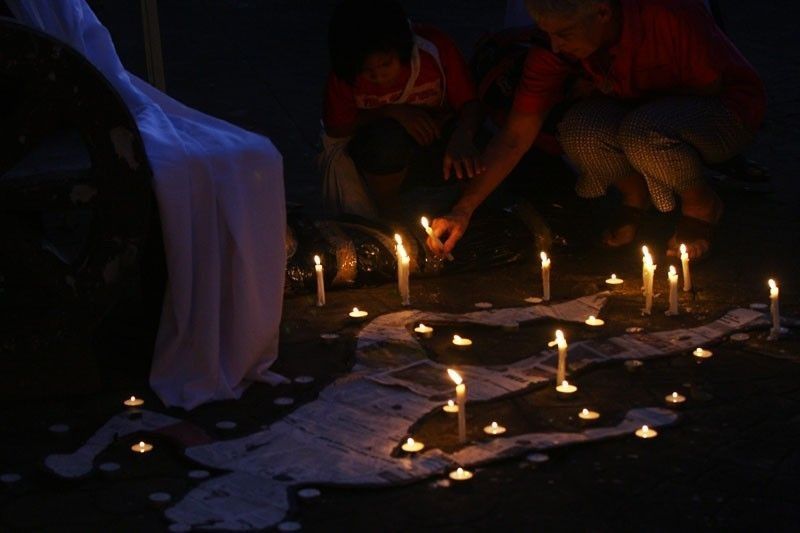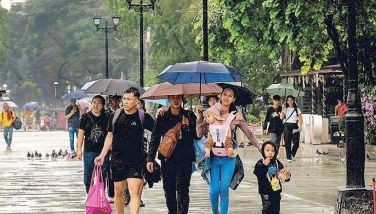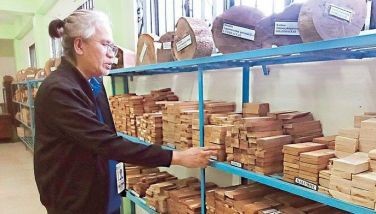Study backs claims that Duterte’s anti-drug campaign is ‘war on the poor,’ nonprofit says

MANILA, Philippines — There is truth to the notion that the Duterte administration's so-called 'war on drugs' is anti-poor, the results of a demographic analysis conducted by a non-government organization into the summary executions linked to the anti-drug campaign suggest.
In a study entitled "Beyond the Numbers", The Initiatives for Dialogue and Empowerment through Alternative Legal Services, Inc., or IDEALS compiled a dataset of some 500 cases of human rights violations dating back to late 2016 until February 2020, largely from Metro Manila, and some from Bulacan, Laguna, Cavite, and Cebu.
The nonprofit in its research found that all cases involved victims who were blue-collared workers, with a majority of them working as construction workers or carpenters, while a sizable portion of the victims also belonged to the informal sector as minimum-wage earners in urban poor communities.
Beyond the Numbers also noted that 99% of the victims never finished tertiary education. Only three were able to graduate from college, while the others were only able to finish high school, elementary, or pre-school—proof, they said, that the war on drugs was a "war on the poor."
As of this post, official police figures have acknowledged just 8,000 "drug personalities" who were slain in official police operations, though rights groups say the actual death toll may be as high as 30,000 since Duterte's "war" began in 2016
Human beings before drug users
Both local and international organizations have said that the nightly killings only increased amid the coronavirus-induced lockdowns, a claim corroborated by the government's own data.
READ: 'Drug war' deaths rise amid coronavirus pandemic — int'l rights monitor
“Through the documentation of these cases, the atrocities committed and condoned by this administration shall not be forgotten,” said Raphael Carlo Brolagda, a lawyer who serves as project coordinator and one of the researchers for the study.
"Regardless of whether the victims were indeed linked to illegal drugs or not, they are human beings with rights enshrined in the constitution," he also said.
According to groups from the United Nations to local rights monitors, cops under the Duterte administration have been handed "near-impunity" by the president's pronouncements and are only further emboldened to carry out the summary executions linked to the administration's flagship campaign against illegal narcotics.
An earlier UN report has also suggested that the planting of evidence by police officers was a common practice. The European Parliament, for its part, has also denounced what it said was the "rapid" deterioration of human rights and press freedom in the Philippines, citing the thousands of extrajudicial killings and human rights violations related to the drug war.
READ: 'Grave violations': Bachelet presents report on Philippines to UN rights council
Group questions lack of investigations
Official police reports on anti-drug operations routinely claim that only suspects who fought back were killed—a narrative Beyond the Numbers’ initial findings also put into question.
According to IDEALS, 26.7% of the victims were never linked to drugs, according to victims’ next of kin.
"Witnesses or families also claimed that 129 of the cases involved warrantless arrests, 66 Tokhang, and only 40 legitimate buy-bust operations compared to state agents’ alleged 128," the group's statement read. "Official records and testimonies of families and/or witnesses further showed that 55% of the incidents involved the Philippine National Police, while 32% were unidentified assailants."
Researchers also recorded 252 killings and 229 arbitrary detentions to go with other instances of torture and enforced disappearances. According to the group, around 45% of the cases included other violations such as planting evidence, taking of property, forceful ingestion of substance, extortion, and sexual violence.
READ: After Human Rights Day arrests, HRW says there is ‘damning history’ of cops planting evidence
Especially telling, the group said in its report, was the lack of investigation being conducted on the cases. According to the NGO's findings, only 32% cases with an initial investigation by the state, 98% had no further action. Furthermore, 58.5% of the cases had no information given to victims or families regarding whether or not any investigation is being implemented.
“The discrepancy between the claims of the victims’ family and witnesses to the incident and those of the state agents was expected,” the researchers wrote in conclusion.
“Though the truth of what actually happened is yet to be determined, the fact remains that the claims of the government are being contested by those who have lost their loved ones despite the fear of experiencing brutality themselves.”
Despite well-documented evidence, police leadership has also completely invalidated the existence of extra-judicial killings, claiming the deaths are but a narrative peddled by the administration's political opposition.
'Women most affected indirectly'
IDEALS’ demographic analysis used a statistical and methodological framework based on the United Nations Human Rights Office of the High Commissioner’s Statistical Classification Framework.
RELATED: 'Negligent in the extreme': HRW says Philippines fails to assist children affected by 'drug war'
Though the study found that 86.2% of the victims were male, it was careful to mention that, “If we are to consider the effects of the campaign against illegal drugs on indirect victims, women are the ones most affected by the post-incident of these HRVs.”
"About 61% or 168 of the total victims were partnered through marriage or common-law relationships. Meanwhile, five were widowed. 83.3% or 129 of the victims have at least one minor dependent on them. The difficulty of losing a source of income compounds the already harsh reality of these families who are left behind,” the group said.
Asked about Investigate PH, an international probe looking into the human rights situation in the Philippines, presidential spokesperson Harry Roque said in Filipino at a press briefing Thursday: "Our position is consistent: our legal systems are working."
Reuters wins Pulitzers, the most prestigious awards in American journalism, in international reporting for its story on the methods of police killing squads in President Rodrigo Duterte’s war on drugs and for feature photography documenting the Rohingya refugee crisis in Myanmar and Bangladesh.
In covering the deadly drug war in the Philippines, Reuters reporters Clare Baldwin, Andrew R.C. Marshall and Manuel Mogato "demonstrated how police in the president’s 'drug war' have killed with impunity and consistently been shielded from prosecution," Reuters Editor-in-Chief Stephen J. Adler says.
Sen. Francis Tolentino says he has agreed to serve as legal counsel for Sen. Bato dela Rosa before the International Criminal Court. — Xave Gregorio
Sen. Ronald "Bato" Dela Rosa says he is “not worried” of the ICC’s resumption of investigation into the brutal war on drugs.
The Commission on Human Rights welcomes the verdict of a Caloocan court that convicted police officer Jeffrey Perez of torture and planting of evidence in the killings of teenagers Carl Arnaiz and Reynaldo “Kulot” de Guzman during former President Rodrigo Duterte’s campaign against illegal drugs.
"The Commission hopes that more cases similar to Carl and Kulot will reach the courts," the government agency says in a statement.
"We hope that more eye witnesses will step forth and feel encouraged to help progress the thousands of drug-related killings still pending investigations and trials," it adds.
The United Nations Office of the High Commissioner for Human Rights' work on the Philippines "is far from done" as victims of the bloody "war on drugs" continue to seek accountability and justice, the Human Rights Watch says.
"The Human Rights Council should adopt OHCHR’s recommendation that the high commissioner’s office continue to monitor and regularly report on the country’s rights situation," Carlos Conde, the senior researcher for Asia Division of the HRW, says in a statement.
"There’s no short-term solution to making real progress on accountability and providing justice for people in the Philippines," he adds.
Gabriela Women's Party supports the request of International Criminal Court Prosecutor Karim Khan to resume probe on President Duterte's drug war killings. — The STAR/Sheila Crisostomo
- Latest
- Trending
































